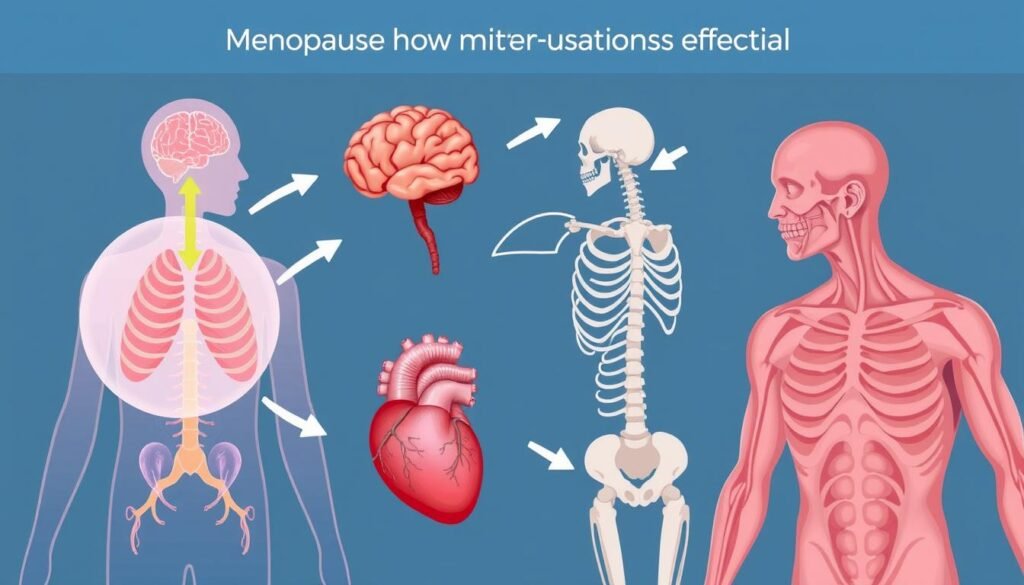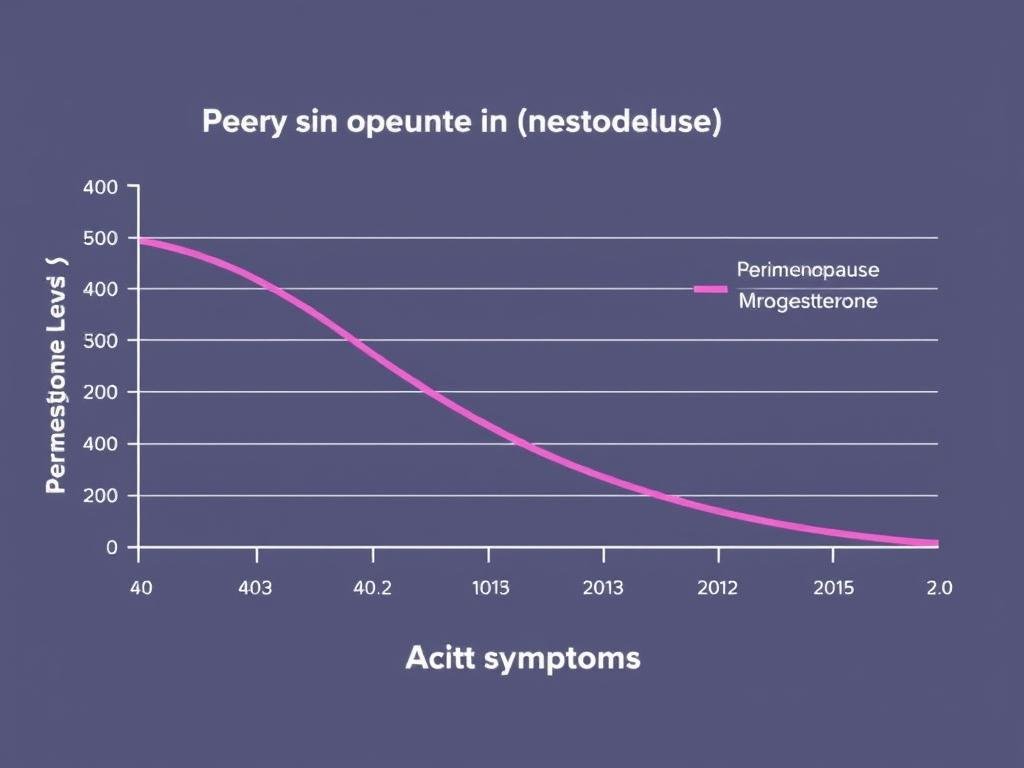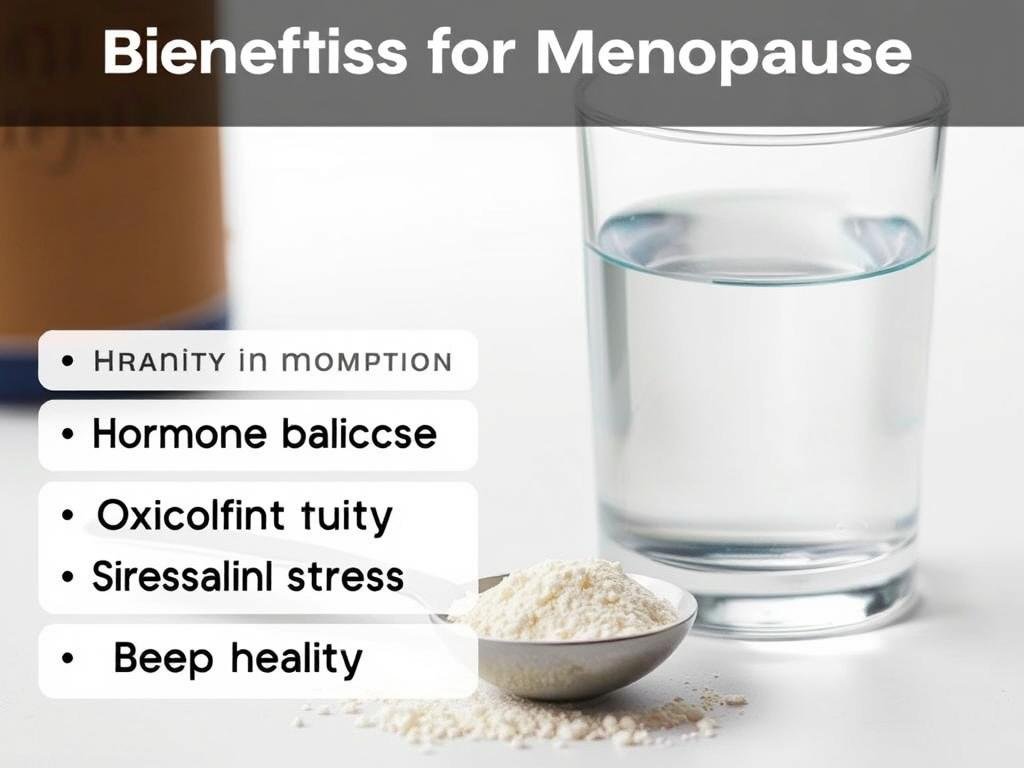Hormone Balance for Menopause: Stop Insomnia, Belly Fat & Mood Swings Naturally

Menopause is far more than just the end of periods and occasional hot flashes. It’s a profound hormonal shift that can affect your entire body, triggering over 50 different symptoms that many women struggle with daily. When hormone levels fluctuate and decline, they can literally break your body down from the inside out, impacting everything from your brain function to your bone density.
If you’re experiencing unexplained weight gain, sleepless nights, mood swings, or that frustrating brain fog that makes you forget words mid-sentence, you’re not alone. These aren’t isolated issues – they’re connected symptoms of hormone imbalance that requires a comprehensive approach, not just quick fixes or band-aid solutions.
The Systemic Impact of Menopause on Your Body
Menopause doesn’t just affect your reproductive organs. It creates a cascade of changes throughout your entire body. As your ovaries reduce their production of estrogen and progesterone, virtually every system in your body feels the impact.
Many women describe this transition as feeling like their body is betraying them. The truth is that these changes are physiological responses to shifting hormone levels that affect everything from your temperature regulation to your cognitive function.
“Menopause can break your body down from the inside out. It’s not just about hot flashes – it’s about a fundamental shift in your body’s chemistry that affects everything from your brain to your bones.”
This systemic impact explains why conventional approaches that only address individual symptoms often fall short. Taking a sleeping pill might help you fall asleep, but it doesn’t address the underlying hormone imbalance causing your insomnia in the first place.
Hormone Imbalance: The Root Cause of Your Symptoms

Understanding the specific roles your hormones play helps explain why their decline causes such widespread symptoms. Let’s look at how each hormone affects your body and what happens when levels drop:
Estrogen: Your Body’s Multitasker
Estrogen does far more than regulate your reproductive cycle. This powerful hormone:
- Regulates your body temperature (preventing hot flashes)
- Balances neurotransmitters like serotonin and dopamine (stabilizing mood)
- Promotes collagen production (maintaining skin elasticity and joint health)
- Supports bone density (preventing osteoporosis)
- Helps maintain healthy cholesterol levels (protecting heart health)
When estrogen levels decline, you may experience:
- Sudden hot flashes and night sweats
- Mood crashes, anxiety, and depression
- Skin sagging and thinning
- Dry eyes, mouth, and vaginal tissues
- Joint pain and stiffness
- Increased risk of bone fractures
Progesterone: Your Sleep and Calm Hormone

Progesterone is often overlooked, but its decline significantly impacts your quality of life:
- Essential for deep, restorative sleep cycles
- Helps manage anxiety and promotes calm
- Balances estrogen’s effects in the body
- Supports thyroid function
When progesterone drops, you may struggle with insomnia, restless sleep, increased anxiety, and heightened stress responses.
Cortisol: The Stress Hormone That Affects Your Waistline
As progesterone levels fall during menopause, cortisol (your stress hormone) often rises. This creates a perfect storm for menopausal weight gain, particularly around your midsection. High cortisol levels:
- Trigger stubborn belly fat storage (even with consistent diet and exercise)
- Contribute to muscle loss and weakness
- Accelerate bone density loss
- Disrupt sleep patterns further
- Increase inflammation throughout the body
This explains why many women find that diets that worked in their 30s no longer work during menopause – hormone imbalance fundamentally changes how your body processes nutrients and stores fat.
The Wide-Ranging Symptoms of Hormone Imbalance

Cognitive Symptoms: When Your Brain Feels Like It’s in a Fog
Many women find the cognitive symptoms of menopause particularly distressing:
- Brain fog that makes simple tasks feel challenging
- Forgetting common words mid-sentence
- Difficulty concentrating on tasks you previously handled with ease
- Memory lapses that can affect your confidence at work and home
These symptoms occur because estrogen helps regulate neurotransmitters that affect memory, focus, and cognitive function. As levels decline, these brain functions can become less efficient.
Physical Symptoms: When Your Body Seems to Betray You

The physical manifestations of hormone imbalance can be both uncomfortable and concerning:
- Sudden hot flashes that can strike anytime
- Heart palpitations and racing that can feel frightening
- Stubborn belly fat that appears despite maintaining your usual diet
- Joint pain and muscle aches that make movement uncomfortable
- Morning stiffness that takes longer to resolve
- Blood pressure fluctuations
- Increased risk of osteoporosis as bone density decreases
Emotional and Relational Impacts: When You Don’t Feel Like Yourself
Perhaps the most profound effects of hormone imbalance are on your emotional wellbeing and relationships:
- Mood swings that can leave you snapping at loved ones or crying unexpectedly
- Anxiety that seems to appear without clear triggers
- Decreased desire and intimacy challenges
- A profound sense of “disappearing” or losing your sense of self
- Feeling disconnected from your body and your relationships
“Many women describe menopause as feeling like they’re disappearing – losing not just physical attributes but parts of their personality and vitality that defined them.”
A Holistic Approach to Hormone Balance for Menopause

While conventional medicine often treats menopause symptoms with sleeping pills, antidepressants, or synthetic hormone replacement, these approaches don’t address the underlying hormone imbalances and can come with significant side effects.
A more effective approach addresses the root causes of your symptoms through three essential pillars:
- Nourishing your body with targeted nutrients that support hormone production and balance
- Prioritizing restorative rest to allow your body to heal and regulate hormone levels
- Moving your body in ways that reduce stress and support hormone balance rather than triggering more cortisol production
Key Nutrients That Support Hormone Balance
Research has identified specific nutrients that can help restore hormone balance and alleviate menopause symptoms:
Creatine: More Than Just a Fitness Supplement

Creatine is gaining recognition for its benefits beyond muscle building:
- Helps balance hormones by supporting cellular energy production
- Reduces oxidative stress that accelerates aging
- Supports deeper, more restorative sleep
- Protects joint and bone health
- Improves cognitive function and mental clarity
Adding creatine to your daily regimen can help address multiple menopause symptoms simultaneously by supporting your body’s fundamental energy systems.
Soursop Bitters: Nature’s Hormone Balancer

Soursop Bitters from Serene Herbs provides a powerful combination of benefits for women experiencing menopause:
- Rich in antioxidants that combat cellular damage from hormonal fluctuations
- Supports natural hormone balance without synthetic hormones
- Reduces inflammation that contributes to joint pain and stiffness
- Helps alleviate hot flashes and night sweats
- Supports better sleep quality and duration
- May reduce anxiety and mood fluctuations
This natural supplement addresses multiple symptoms at their root cause by supporting your body’s own hormone regulation systems.
Supporting Your Body Through Menopause

In addition to targeted supplements, these lifestyle practices support hormone balance:
Nutrition Strategies
- Increase phytoestrogen-rich foods like flaxseeds and fermented soy
- Prioritize anti-inflammatory foods
- Reduce sugar and refined carbohydrates that spike insulin
- Stay hydrated to support hormone transport
Lifestyle Approaches
- Practice stress-reduction techniques that lower cortisol
- Prioritize sleep hygiene for better rest
- Choose gentle movement like walking and yoga
- Limit caffeine and alcohol that can trigger hot flashes
Reclaim Your Balance, Energy and Confidence

Menopause doesn’t have to mean surrendering to uncomfortable symptoms or feeling like you’re losing yourself. By addressing the root cause – hormone imbalance – rather than just masking individual symptoms, you can experience profound improvements in how you feel physically, mentally, and emotionally.
The journey through menopause can actually become a doorway to a new phase of vitality when you support your body’s changing needs with the right nutrients and lifestyle practices.
Take the First Step Toward Hormone Balance Today
Join thousands of women who have found relief from menopause symptoms with Soursop Bitters from Serene Herbs.
“Hormone balance isn’t just about eliminating symptoms – it’s about reclaiming your energy, your clarity, and your sense of self during this important life transition.”






